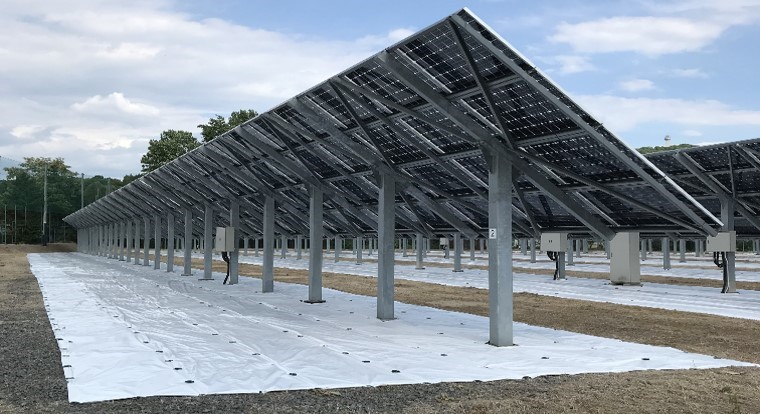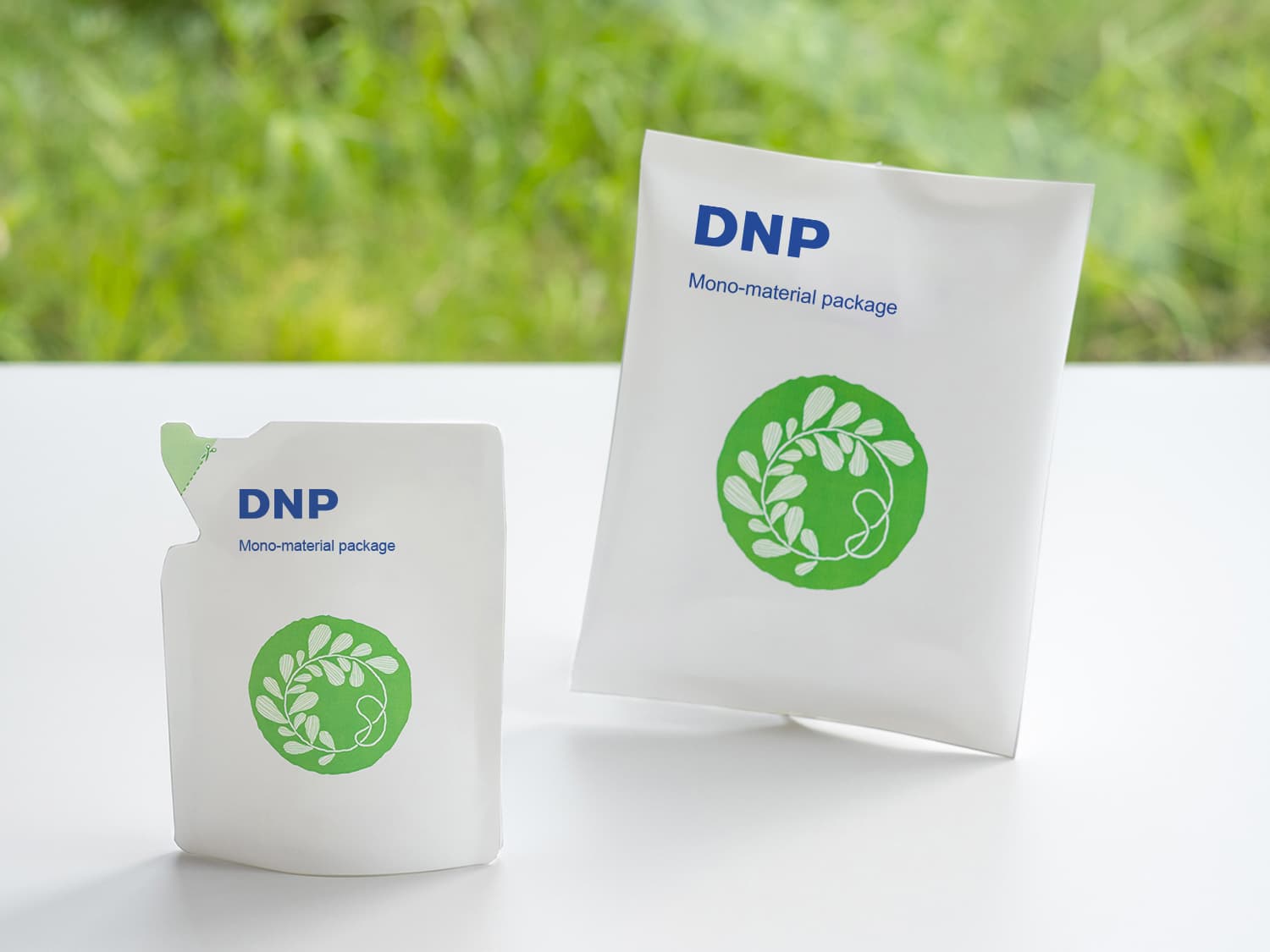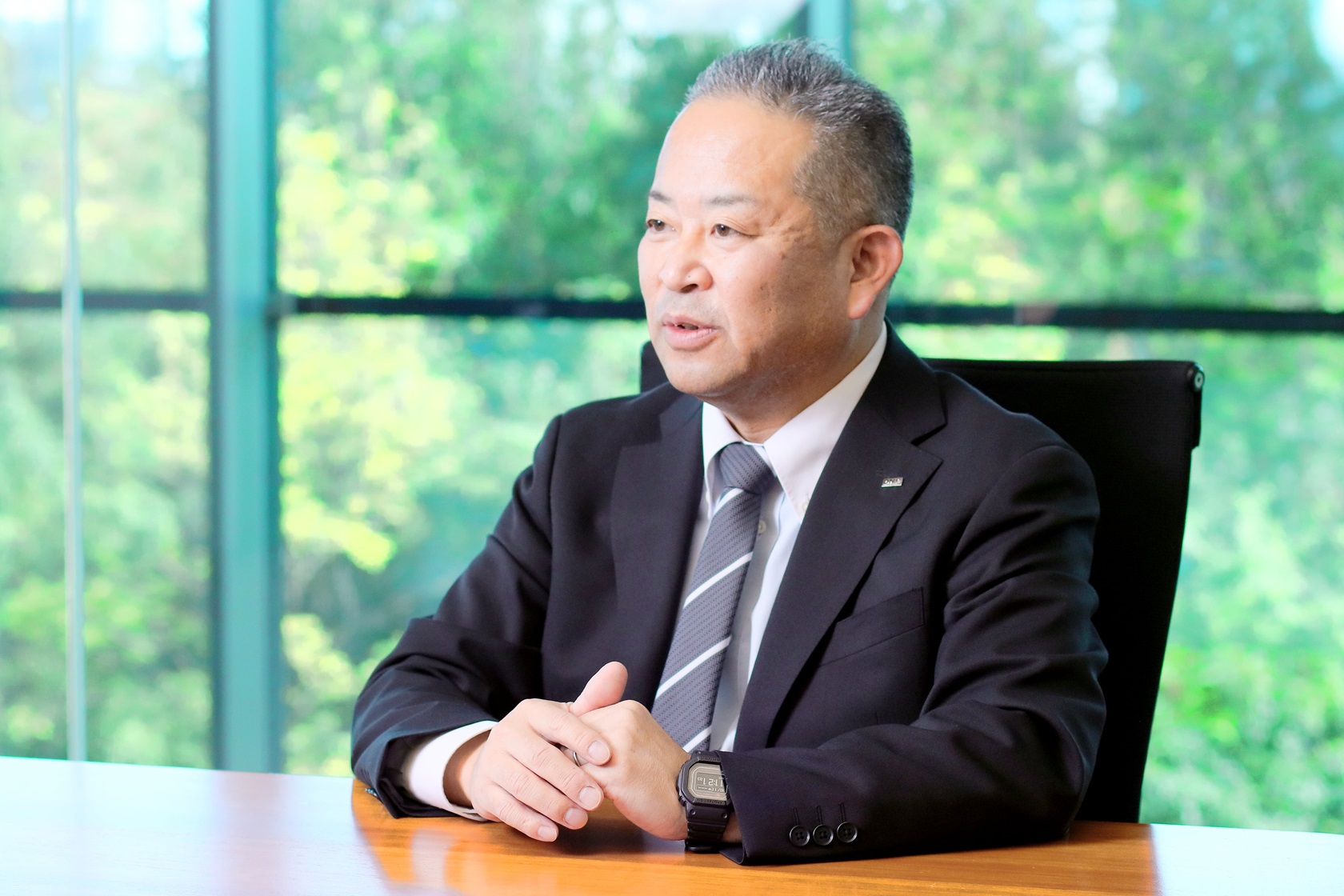
Executive interview: Achieving a Society Where Minimizing Environmental Impact Becomes Standard Practice
Specific frameworks aimed at minimizing environmental impact, combined with increased employees’ environmental awareness and consequent behavioral changes, led the DNP Group to announce in 2024 a more ambitious greenhouse gas (GHG) emissions reduction target for fiscal 2030 than initially planned. The Group also updated its goals in areas such as recycling rate and water usage reduction. We interviewed Corporate Officer Hideto Sakata, who is responsible for the Group’s environment-related issues, to understand how the Group was able to achieve its initial environmental goals much earlier than expected and the initiatives it is undertaking to realize carbon neutrality.
- Group achieves 90% of the initial 2030 GHG emissions-reduction goal by March 2023
- Fundamentally changing business operations and building a framework for continuous reflection on environmental sustainability
- Integrating environmental considerations into all products and services in an era when contributing to environmental sustainability creates value
- Becoming a leader in advancing a decarbonized society through a virtuous cycle of contributing to environmental sustainability and business growth

|
|---|
Hideto Sakata
Corporate Officer, Dai Nippon Printing Co., Ltd.
In charge of the Information Communication Production Management Operations, R&D and Engineering Management Division, Technology Development Center
Group achieves 90% of the initial 2030 GHG emissions-reduction goal by March 2023
Q: DNP has outlined its “DNP Group Environmental Vision 2050” to achieve a sustainable society. In April 2024, the Group raised its numerical targets in several areas, including GHG emissions reductions and the recycling rate. Could you tell us what factors contributed to the upward revisions of these targets?
Our company has a long history of implementing eco-friendly measures. Over half a century ago, in 1972, we established a section (Environment Department) at our head office dedicated to addressing environmental issues. The section launched primarily on energy-saving initiatives and activities to conserve the environment surrounding our factories. In 2000, we formalized our Environmental Policy, which has facilitated ongoing efforts in this area.
There has been increased environmental awareness in society since the Paris Agreement was adopted in 2015, and Sustainable Development Goals (SDGs) have been embraced by people worldwide in recent years. Against this backdrop, we outlined the "DNP Group Environmental Vision 2050" in 2020, driven by the belief that corporations must lead the effort to realize a sustainable society. As our ideal state for 2050, we aim to achieve a decarbonized society, a recycling-oriented society, and a society in harmony with nature. In line with these goals, we have taken measures to reach net-zero GHG emissions from business activities at our sites, to effectively use recycled resources throughout the entire value chain, and to conserve biodiversity.
As midterm numerical targets leading up to fiscal 2025, serving as a precursor to the Environmental Vision, we established specific numerical goals. By the end of March 2023, however, we had achieved 90% of the GHG emissions reductions targeted for fiscal 2030. Additionally, as we anticipated early success in areas such as increasing the recycling rate, reducing water usage, and expanding eco-friendly products and services, we decided to raise our goals for fiscal 2030 to secure attainment of the Vision.
Table: New environmental targets
|
|
Our products and services, developed through the application and further advancement of printing technologies, are ubiquitous in the everyday lives of people around the world. They include packaging materials, interior and exterior decoration materials, smart cards, and electronic components, among others. These items have become essential in our daily routines. This emphasizes the need for us to take a leading role in realizing a decarbonized society, a recycling-oriented society, and a society in harmony with nature. As a frontrunner in the printing industry that has successfully expanded its fields of business activities, DNP bears significant responsibility in this effort.
DNP has been strongly committed to environmental measures for over 50 years, which has deeply embedded environmental awareness into our corporate culture. Because of our past efforts and the solid foundation we have built, we have been able to raise our mission and goals to a higher level.
Fundamentally changing business operations and building a framework for continuous reflection on environmental sustainability
Q: What were the key factors in achieving the initial goals ahead of schedule? Could you elaborate on the specific measures implemented?
We established clear numerical targets as midterm goals and implemented specific frameworks to achieve them. I believe this strategy has been very effective. Instead of just promoting a slogan like “Let's save energy,” we introduced frameworks designed to encourage each employee to change their behavior. One such initiative is the "Internal Carbon Pricing (ICP) System." Anticipating a potential future carbon tax, DNP established its own carbon pricing, which is incorporated into our facility renewal standards to promote the adoption of highly effective energy-saving measures.
The R&D and Engineering Management Division, which I oversee, frequently receives capital investment applications from various departments. These applications contain sections that specify whether the project considers environmental impacts, in addition to assessing the potential for investment recovery and confirming that appropriate safety measures have been considered.
With this system we have established “contribution to environmental sustainability” as an essential process on par with cost-effectiveness and safety measures.
To promote environmental measures throughout our company, our head office gathered outstanding examples from factories and offices across the nation and introduced these initiatives to others. By sharing these exemplary cases, many factories are encouraged to emulate them, creating a virtuous cycle that enhances the quality of energy-saving efforts at each facility.
As our employees’ environmental awareness was further enhanced, their understanding of preventing the production of defective products gradually improved. Curbing the production of defective products helps minimize the waste of raw materials and energy consumption. As a result, employees now really get that cutting down on defective products not only saves money but also helps with environmental sustainability. That’s something I have seen from my experience.
A major factor in the successful endeavor to change employees’ awareness and behaviors was the establishment of an environment section at the R&D and Engineering Management Division. This section is responsible for facilitating the development of new products and streamlining existing business operations.
Previously, DNP had an environmental team within the head office’s sustainability promotion division. However, this team struggled to get deeply involved in forging collaboration between different departments, such as sales promotion and production. By establishing the environmental section at the R&D and Engineering Management Division, which has a comprehensive understanding of each workplace, we strengthened partnerships among various departments and factories. This fundamental change to the operational structure has allowed us to accelerate changes in our business operations to focus on decarbonization.
|
|
Integrating environmental considerations into all products and services in an era when contributing to environmental sustainability creates value
Q: How do you plan to leverage the strengths of the DNP Group to provide “environmental value” to society?
The DNP Group has consistently engaged in the proactive development of technologies, products, and services to reduce environmental impacts, while regularly reviewing its business portfolio to respond to and stay ahead of societal changes.
For example, in the semiconductor business, one of the Group's growth areas, we are promoting a new chip manufacturing method called “Nanoimprint lithography.” This method is expected to significantly reduce GHG emissions during production compared to the currently dominant method. In 2022, DNP received a prize for this technology at the 49th Environmental Awards⋆1, sponsored by the National Institute for Environmental Studies and the Nikkan Kogyo Shimbun, with support from the Ministry of the Environment. Our company is actively working on commercializing this technology.
- *1 Environmental Awards: Established in 1974, when addressing pollution problems was a pressing issue in Japan, the awards honor individuals, corporations, organizations, and groups that have taken outstanding initiatives to meet the demands of the time and contribute to environmental conservation and the enhancement of environmental quality.
-
*Nanoimprint lithography accelerating carbon neutrality in semiconductor production
https://www.global.dnp/media/detail/20167700_4104.html
Also, exterior roof decoration films (roof decal) developed by DNP can significantly reduce GHG emissions associated with decorating automobile roofs by simply adhering patterned films to the roofs. Traditionally, decorating the roofs after the vehicle bodies have been paint-coated involves a masking process to cover areas not needing decoration, followed by a paint-drying process. However, using the exterior decoration films for roofs can eliminate these steps, thereby reducing energy consumption and GHG emissions in the process.
-
*Exterior decoration films, roof decals, enhance the design quality of automobiles and eliminate the paint-coating process for roof decoration.
https://www.global.dnp/biz/solution/products/detail/10161261_4130.html
|
Image of exterior decoration film, roof decal |
The DNP Group has established 10-point Guidelines for Developing Eco-friendly Products and Services, focusing on reducing environmental impacts throughout their life cycles starting from the developmental phase. Based on these guidelines, we are creating eco-friendly offerings. We conduct our own numerical evaluations of measures implemented across the entire life cycle of products and services to minimize environmental impacts. We categorize outstanding products and services as “super-eco products.” In our updated midterm goals, we aim to increase the sales of super-eco products to as much as 30% of our total sales. We are committed to contributing to environmental sustainability across all business areas and in all our products and services.
Promoting business activities and reducing environmental impact may seem to be in conflict. However, I believe that in this era, providing products and services can actually create business opportunities. This shift presents a significant opportunity for DNP, which has a long history of anticipating future standards.
Q: The initiatives taken by the DNP Group are expected to have a significant impact on the supply chain. From that perspective, could you share your thoughts on partnerships with other companies?
A recycling-oriented society cannot be achieved by the DNP Group alone. It is crucial to provide environmental value in partnership with the entire supply chain. For example, DNP produces PET plastic bottles. Our mission to circulate these resources involves not only forging partnerships with local governments and relevant companies, but also efforts to change consumer awareness. Therefore, we participate in creating frameworks for collecting plastic waste and recycling it into new resources, as well as engaging in demonstration projects. Additionally, we will strengthen our networks with partner companies and local governments by actively participating in environment-related industry organizations, thereby accelerating the realization of a circular economy.
-
*An example of introducing the eco-friendly design guide: Demonstration project to recycle pharmaceutical containers by the Fukuoka prefectural government and the DNP Group.
https://www.dnp.co.jp/biz/case/detail/20175168_4968.html (Japanese only)
Becoming a leader in advancing a decarbonized society through a virtuous cycle of contributing to environmental sustainability and business growth
Q: Could you share the future prospects for the DNP Group in contributing to environmental sustainability?
Tackling environmental challenges is no longer something extraordinary for companies; it is a responsibility that they must shoulder as a matter of course. I hope that the DNP Group will be a leading force in realizing a sustainable society, with each employee taking a proactive role in various activities based on the DNP Group Environmental Vision 2050.
Also, we will focus on achieving “nature-positive”⋆2. When I was a child, I was taught to leave a place more beautiful than when I arrived. I believe this is a very important principle. Personally, I resonate with many aspects of nature-positive.
- *2 Nature positive: This concept involves conserving and enhancing the resilience of our planet and societies to halt and reverse nature loss. Gaining traction from the perspectives of biodiversity and natural capital, it calls for improvements in all areas, including the economy, society, politics, and technology.
As a specific endeavor, I would like to highlight the "Ichigaya no mori (Ichigaya Forest)" project, which involves the forest surrounding our head office in the Ichigaya district of Tokyo. This project focuses on planting native species unique to the region to promote biodiversity. The aim is to create an environment that will ultimately cover an area of 20,000 m² and which is in harmony with the local ecosystem. We are committed to pursuing this project from a long-term perspective, as the forest will serve as a valuable legacy that the DNP Group leaves for society 100 years from now.
-
*DNP received the 43rd Green City Award for Ichigaya no mori, a forest nurtured by the efforts of its employees.
https://www.dnp.co.jp/media/detail/20173446_1563.html (Japanese only)
Environmental measures will enhance corporate value and increase employee engagement. Creating products and services that contribute to environmental sustainability will lead to a sense of pride in every employee, leading to fulfillment and a sense of achievement. This pride will serve as a driving force for future initiatives. I have already observed this virtuous cycle emerging in our workplaces. By steadily achieving the goals outlined in our roadmap leading up to 2050, we are committed to realizing a decarbonized society, a recycling-oriented society, and a society in harmony with nature.
|
|
-
*Please note that the information contained in this story was accurate as of the publication date.
January 16, 2025 by DNP Features Editorial Department
Discover more
Related products and services
DNP reflective sheets for solar power plants(Open in a new window)

The newly offered product is a sheet that is laid on the ground surface at power plants in...
DNP's Mono-material Packaging(Open in a new window)

This environmentally friendly package is made from a single material (Mono-material), maki...






